Contract Law Analysis: Consideration and Exclusion Clauses in Business
VerifiedAdded on 2023/06/14
|9
|2247
|78
Case Study
AI Summary
This case study analyzes three distinct legal issues within a business law context. The first issue explores John's entitlement to additional payments from Ivor, applying the rules of consideration and the exceptions established in Stilk v Myrrick and Williams v Roffey Bros. The analysis concludes that John is entitled to the payments due to the practical advantage conferred upon Ivor. The second issue examines Evans' promise to forgo a portion of Ivor's debt, utilizing the rule that part consideration is not good consideration, referencing Pinnel's case and Foakes v Beer. It concludes that Ivor does not have to pay the additional amount due to an exception. Finally, the study investigates the validity of Owen's exclusion clause, applying principles of incorporation from Olley v Marlborough Court and Thompson v LMS Railway, along with the contra proferentem rule from Andrews Bros ltd v Singer Cars, determining that the clause is invalid and Ivor can claim damages. Desklib is a platform where you can find similar solved assignments and study tools.
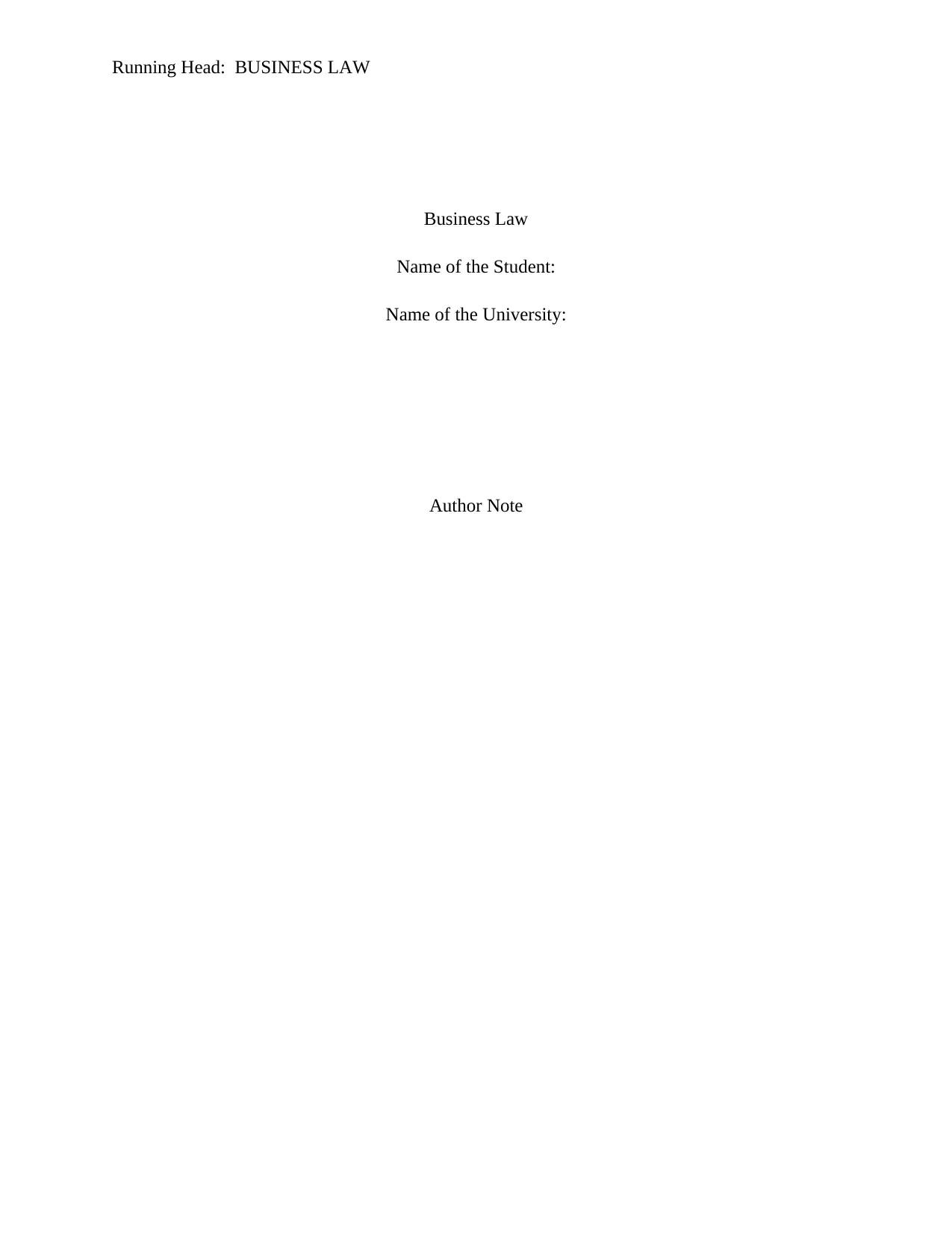
Running Head: BUSINESS LAW
Business Law
Name of the Student:
Name of the University:
Author Note
Business Law
Name of the Student:
Name of the University:
Author Note
Paraphrase This Document
Need a fresh take? Get an instant paraphrase of this document with our AI Paraphraser
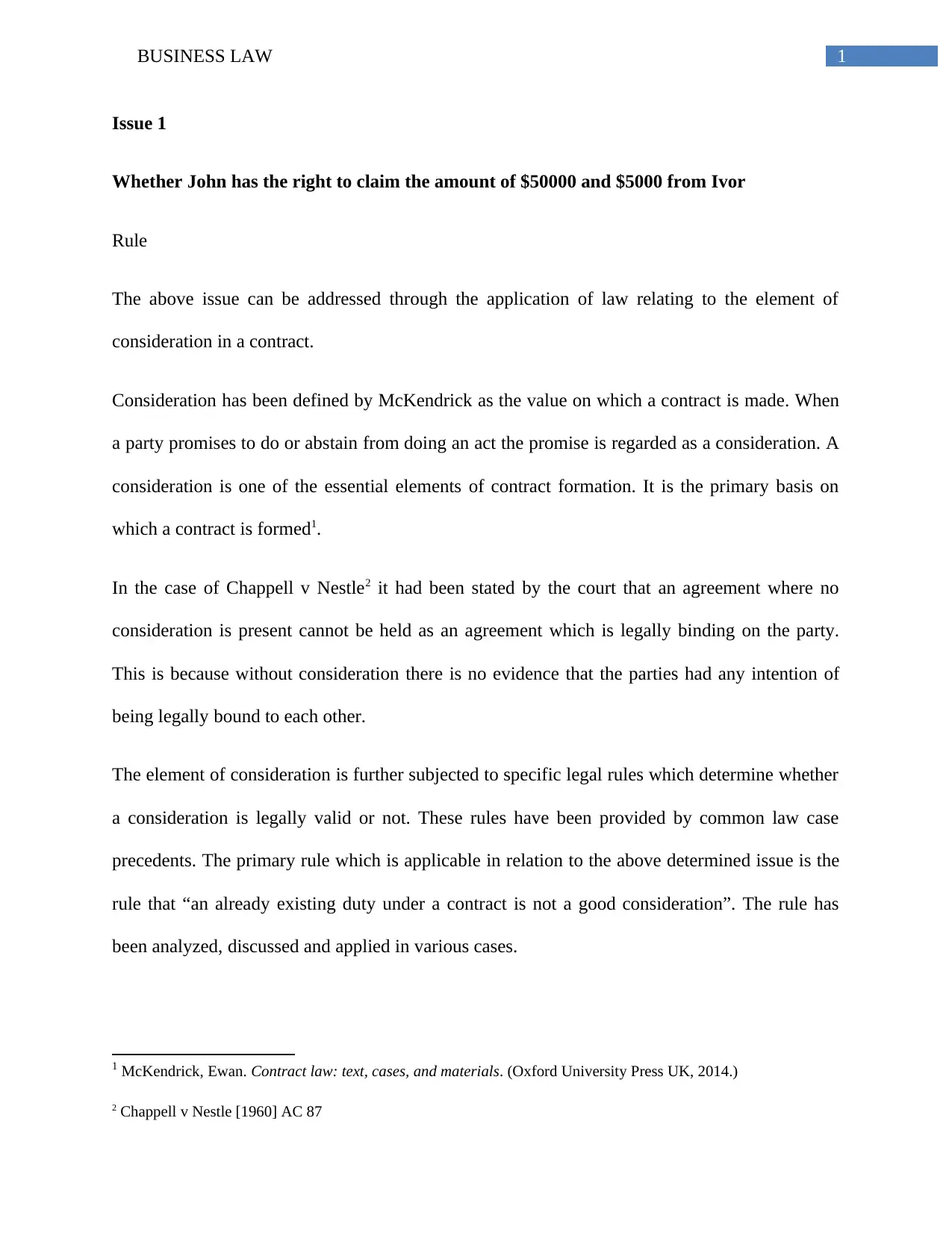
1BUSINESS LAW
Issue 1
Whether John has the right to claim the amount of $50000 and $5000 from Ivor
Rule
The above issue can be addressed through the application of law relating to the element of
consideration in a contract.
Consideration has been defined by McKendrick as the value on which a contract is made. When
a party promises to do or abstain from doing an act the promise is regarded as a consideration. A
consideration is one of the essential elements of contract formation. It is the primary basis on
which a contract is formed1.
In the case of Chappell v Nestle2 it had been stated by the court that an agreement where no
consideration is present cannot be held as an agreement which is legally binding on the party.
This is because without consideration there is no evidence that the parties had any intention of
being legally bound to each other.
The element of consideration is further subjected to specific legal rules which determine whether
a consideration is legally valid or not. These rules have been provided by common law case
precedents. The primary rule which is applicable in relation to the above determined issue is the
rule that “an already existing duty under a contract is not a good consideration”. The rule has
been analyzed, discussed and applied in various cases.
1 McKendrick, Ewan. Contract law: text, cases, and materials. (Oxford University Press UK, 2014.)
2 Chappell v Nestle [1960] AC 87
Issue 1
Whether John has the right to claim the amount of $50000 and $5000 from Ivor
Rule
The above issue can be addressed through the application of law relating to the element of
consideration in a contract.
Consideration has been defined by McKendrick as the value on which a contract is made. When
a party promises to do or abstain from doing an act the promise is regarded as a consideration. A
consideration is one of the essential elements of contract formation. It is the primary basis on
which a contract is formed1.
In the case of Chappell v Nestle2 it had been stated by the court that an agreement where no
consideration is present cannot be held as an agreement which is legally binding on the party.
This is because without consideration there is no evidence that the parties had any intention of
being legally bound to each other.
The element of consideration is further subjected to specific legal rules which determine whether
a consideration is legally valid or not. These rules have been provided by common law case
precedents. The primary rule which is applicable in relation to the above determined issue is the
rule that “an already existing duty under a contract is not a good consideration”. The rule has
been analyzed, discussed and applied in various cases.
1 McKendrick, Ewan. Contract law: text, cases, and materials. (Oxford University Press UK, 2014.)
2 Chappell v Nestle [1960] AC 87
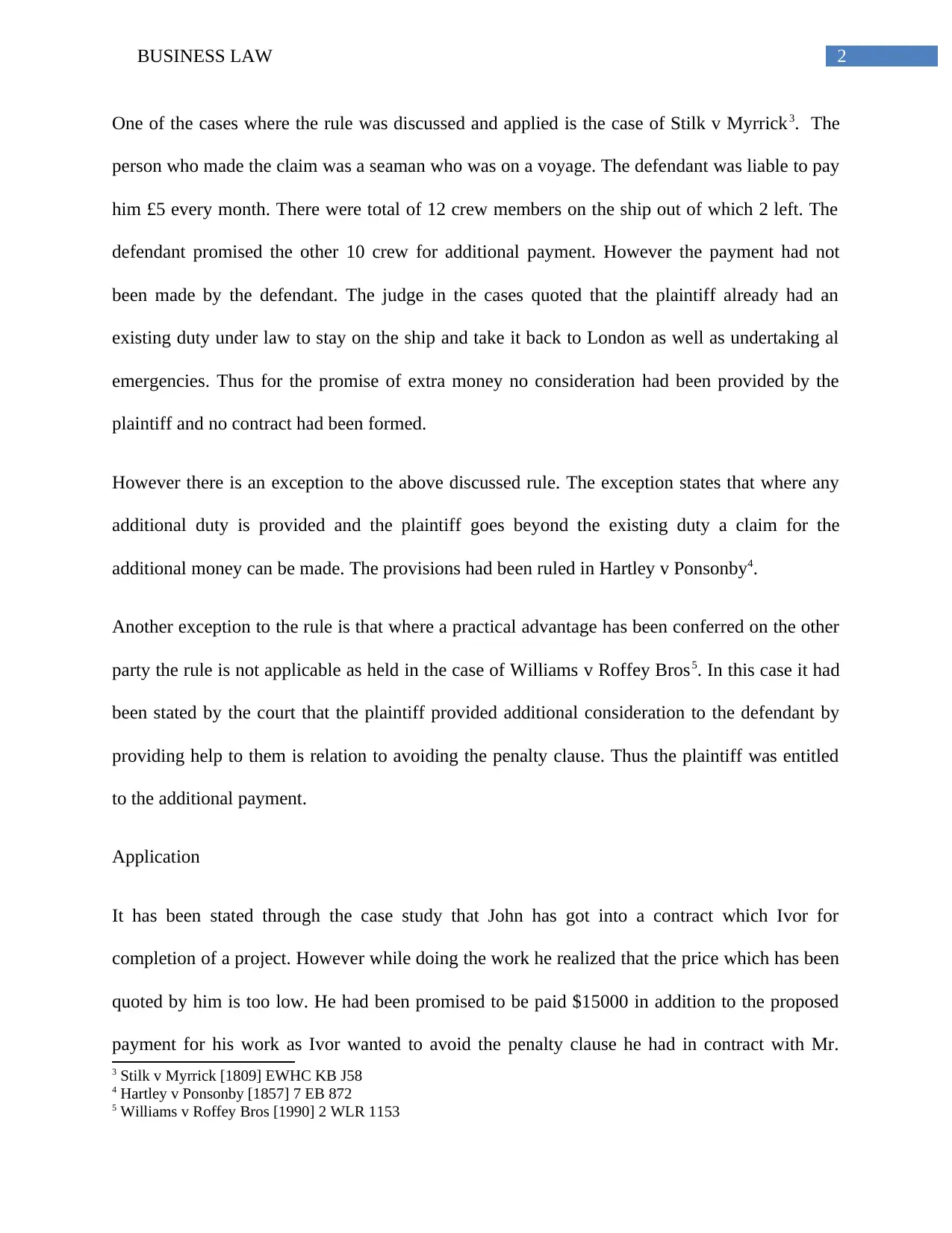
2BUSINESS LAW
One of the cases where the rule was discussed and applied is the case of Stilk v Myrrick3. The
person who made the claim was a seaman who was on a voyage. The defendant was liable to pay
him £5 every month. There were total of 12 crew members on the ship out of which 2 left. The
defendant promised the other 10 crew for additional payment. However the payment had not
been made by the defendant. The judge in the cases quoted that the plaintiff already had an
existing duty under law to stay on the ship and take it back to London as well as undertaking al
emergencies. Thus for the promise of extra money no consideration had been provided by the
plaintiff and no contract had been formed.
However there is an exception to the above discussed rule. The exception states that where any
additional duty is provided and the plaintiff goes beyond the existing duty a claim for the
additional money can be made. The provisions had been ruled in Hartley v Ponsonby4.
Another exception to the rule is that where a practical advantage has been conferred on the other
party the rule is not applicable as held in the case of Williams v Roffey Bros5. In this case it had
been stated by the court that the plaintiff provided additional consideration to the defendant by
providing help to them is relation to avoiding the penalty clause. Thus the plaintiff was entitled
to the additional payment.
Application
It has been stated through the case study that John has got into a contract which Ivor for
completion of a project. However while doing the work he realized that the price which has been
quoted by him is too low. He had been promised to be paid $15000 in addition to the proposed
payment for his work as Ivor wanted to avoid the penalty clause he had in contract with Mr.
3 Stilk v Myrrick [1809] EWHC KB J58
4 Hartley v Ponsonby [1857] 7 EB 872
5 Williams v Roffey Bros [1990] 2 WLR 1153
One of the cases where the rule was discussed and applied is the case of Stilk v Myrrick3. The
person who made the claim was a seaman who was on a voyage. The defendant was liable to pay
him £5 every month. There were total of 12 crew members on the ship out of which 2 left. The
defendant promised the other 10 crew for additional payment. However the payment had not
been made by the defendant. The judge in the cases quoted that the plaintiff already had an
existing duty under law to stay on the ship and take it back to London as well as undertaking al
emergencies. Thus for the promise of extra money no consideration had been provided by the
plaintiff and no contract had been formed.
However there is an exception to the above discussed rule. The exception states that where any
additional duty is provided and the plaintiff goes beyond the existing duty a claim for the
additional money can be made. The provisions had been ruled in Hartley v Ponsonby4.
Another exception to the rule is that where a practical advantage has been conferred on the other
party the rule is not applicable as held in the case of Williams v Roffey Bros5. In this case it had
been stated by the court that the plaintiff provided additional consideration to the defendant by
providing help to them is relation to avoiding the penalty clause. Thus the plaintiff was entitled
to the additional payment.
Application
It has been stated through the case study that John has got into a contract which Ivor for
completion of a project. However while doing the work he realized that the price which has been
quoted by him is too low. He had been promised to be paid $15000 in addition to the proposed
payment for his work as Ivor wanted to avoid the penalty clause he had in contract with Mr.
3 Stilk v Myrrick [1809] EWHC KB J58
4 Hartley v Ponsonby [1857] 7 EB 872
5 Williams v Roffey Bros [1990] 2 WLR 1153
⊘ This is a preview!⊘
Do you want full access?
Subscribe today to unlock all pages.

Trusted by 1+ million students worldwide
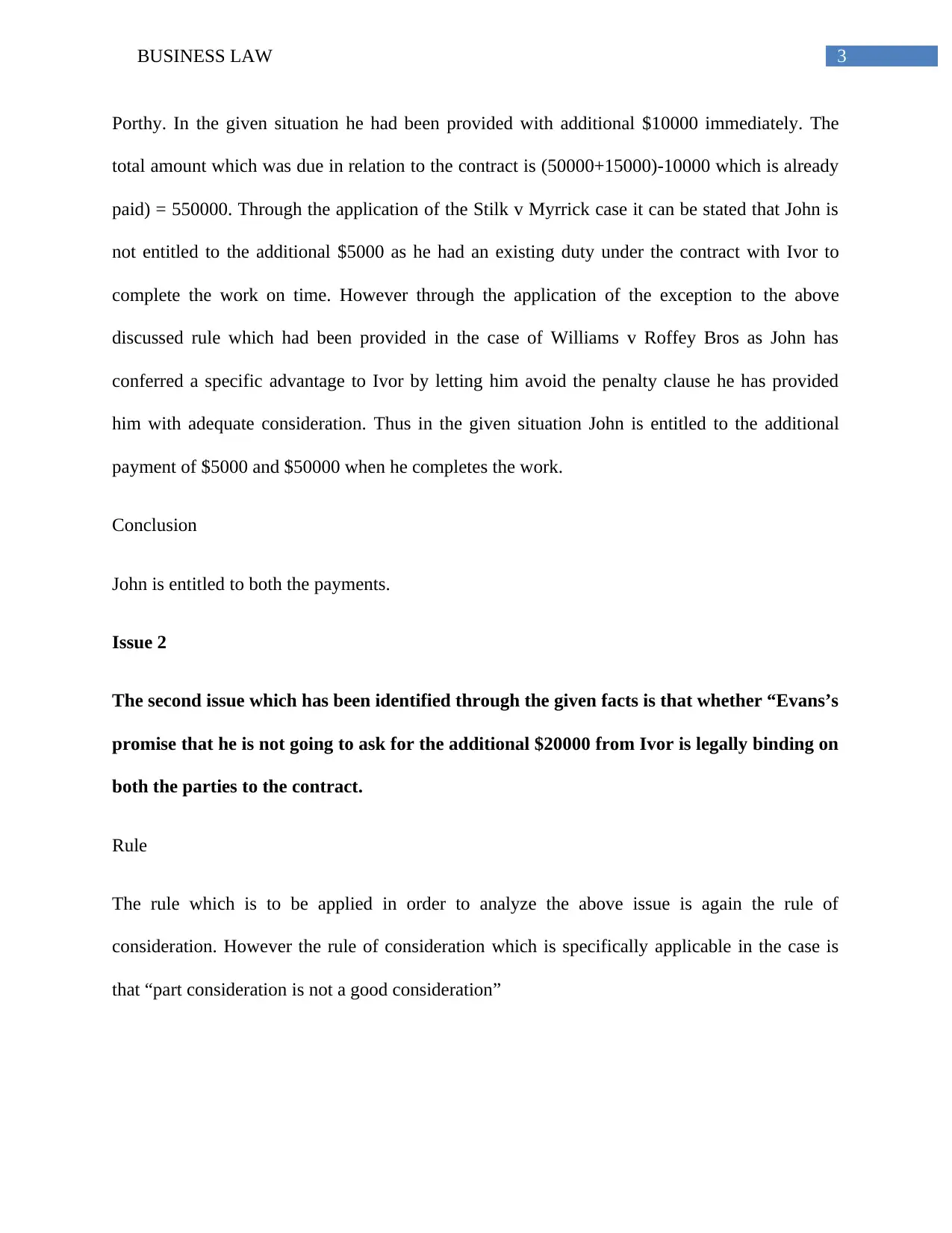
3BUSINESS LAW
Porthy. In the given situation he had been provided with additional $10000 immediately. The
total amount which was due in relation to the contract is (50000+15000)-10000 which is already
paid) = 550000. Through the application of the Stilk v Myrrick case it can be stated that John is
not entitled to the additional $5000 as he had an existing duty under the contract with Ivor to
complete the work on time. However through the application of the exception to the above
discussed rule which had been provided in the case of Williams v Roffey Bros as John has
conferred a specific advantage to Ivor by letting him avoid the penalty clause he has provided
him with adequate consideration. Thus in the given situation John is entitled to the additional
payment of $5000 and $50000 when he completes the work.
Conclusion
John is entitled to both the payments.
Issue 2
The second issue which has been identified through the given facts is that whether “Evans’s
promise that he is not going to ask for the additional $20000 from Ivor is legally binding on
both the parties to the contract.
Rule
The rule which is to be applied in order to analyze the above issue is again the rule of
consideration. However the rule of consideration which is specifically applicable in the case is
that “part consideration is not a good consideration”
Porthy. In the given situation he had been provided with additional $10000 immediately. The
total amount which was due in relation to the contract is (50000+15000)-10000 which is already
paid) = 550000. Through the application of the Stilk v Myrrick case it can be stated that John is
not entitled to the additional $5000 as he had an existing duty under the contract with Ivor to
complete the work on time. However through the application of the exception to the above
discussed rule which had been provided in the case of Williams v Roffey Bros as John has
conferred a specific advantage to Ivor by letting him avoid the penalty clause he has provided
him with adequate consideration. Thus in the given situation John is entitled to the additional
payment of $5000 and $50000 when he completes the work.
Conclusion
John is entitled to both the payments.
Issue 2
The second issue which has been identified through the given facts is that whether “Evans’s
promise that he is not going to ask for the additional $20000 from Ivor is legally binding on
both the parties to the contract.
Rule
The rule which is to be applied in order to analyze the above issue is again the rule of
consideration. However the rule of consideration which is specifically applicable in the case is
that “part consideration is not a good consideration”
Paraphrase This Document
Need a fresh take? Get an instant paraphrase of this document with our AI Paraphraser
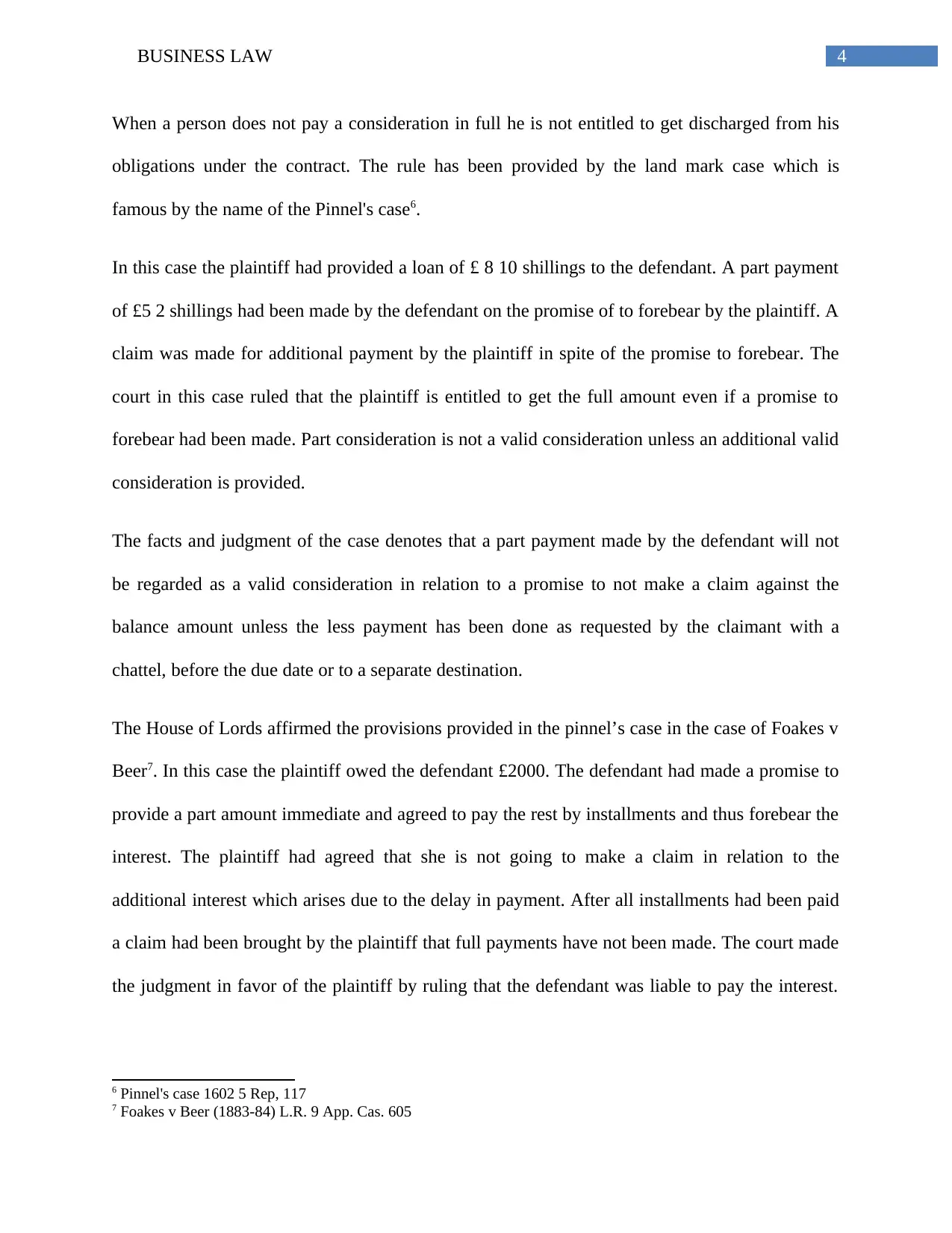
4BUSINESS LAW
When a person does not pay a consideration in full he is not entitled to get discharged from his
obligations under the contract. The rule has been provided by the land mark case which is
famous by the name of the Pinnel's case6.
In this case the plaintiff had provided a loan of £ 8 10 shillings to the defendant. A part payment
of £5 2 shillings had been made by the defendant on the promise of to forebear by the plaintiff. A
claim was made for additional payment by the plaintiff in spite of the promise to forebear. The
court in this case ruled that the plaintiff is entitled to get the full amount even if a promise to
forebear had been made. Part consideration is not a valid consideration unless an additional valid
consideration is provided.
The facts and judgment of the case denotes that a part payment made by the defendant will not
be regarded as a valid consideration in relation to a promise to not make a claim against the
balance amount unless the less payment has been done as requested by the claimant with a
chattel, before the due date or to a separate destination.
The House of Lords affirmed the provisions provided in the pinnel’s case in the case of Foakes v
Beer7. In this case the plaintiff owed the defendant £2000. The defendant had made a promise to
provide a part amount immediate and agreed to pay the rest by installments and thus forebear the
interest. The plaintiff had agreed that she is not going to make a claim in relation to the
additional interest which arises due to the delay in payment. After all installments had been paid
a claim had been brought by the plaintiff that full payments have not been made. The court made
the judgment in favor of the plaintiff by ruling that the defendant was liable to pay the interest.
6 Pinnel's case 1602 5 Rep, 117
7 Foakes v Beer (1883-84) L.R. 9 App. Cas. 605
When a person does not pay a consideration in full he is not entitled to get discharged from his
obligations under the contract. The rule has been provided by the land mark case which is
famous by the name of the Pinnel's case6.
In this case the plaintiff had provided a loan of £ 8 10 shillings to the defendant. A part payment
of £5 2 shillings had been made by the defendant on the promise of to forebear by the plaintiff. A
claim was made for additional payment by the plaintiff in spite of the promise to forebear. The
court in this case ruled that the plaintiff is entitled to get the full amount even if a promise to
forebear had been made. Part consideration is not a valid consideration unless an additional valid
consideration is provided.
The facts and judgment of the case denotes that a part payment made by the defendant will not
be regarded as a valid consideration in relation to a promise to not make a claim against the
balance amount unless the less payment has been done as requested by the claimant with a
chattel, before the due date or to a separate destination.
The House of Lords affirmed the provisions provided in the pinnel’s case in the case of Foakes v
Beer7. In this case the plaintiff owed the defendant £2000. The defendant had made a promise to
provide a part amount immediate and agreed to pay the rest by installments and thus forebear the
interest. The plaintiff had agreed that she is not going to make a claim in relation to the
additional interest which arises due to the delay in payment. After all installments had been paid
a claim had been brought by the plaintiff that full payments have not been made. The court made
the judgment in favor of the plaintiff by ruling that the defendant was liable to pay the interest.
6 Pinnel's case 1602 5 Rep, 117
7 Foakes v Beer (1883-84) L.R. 9 App. Cas. 605
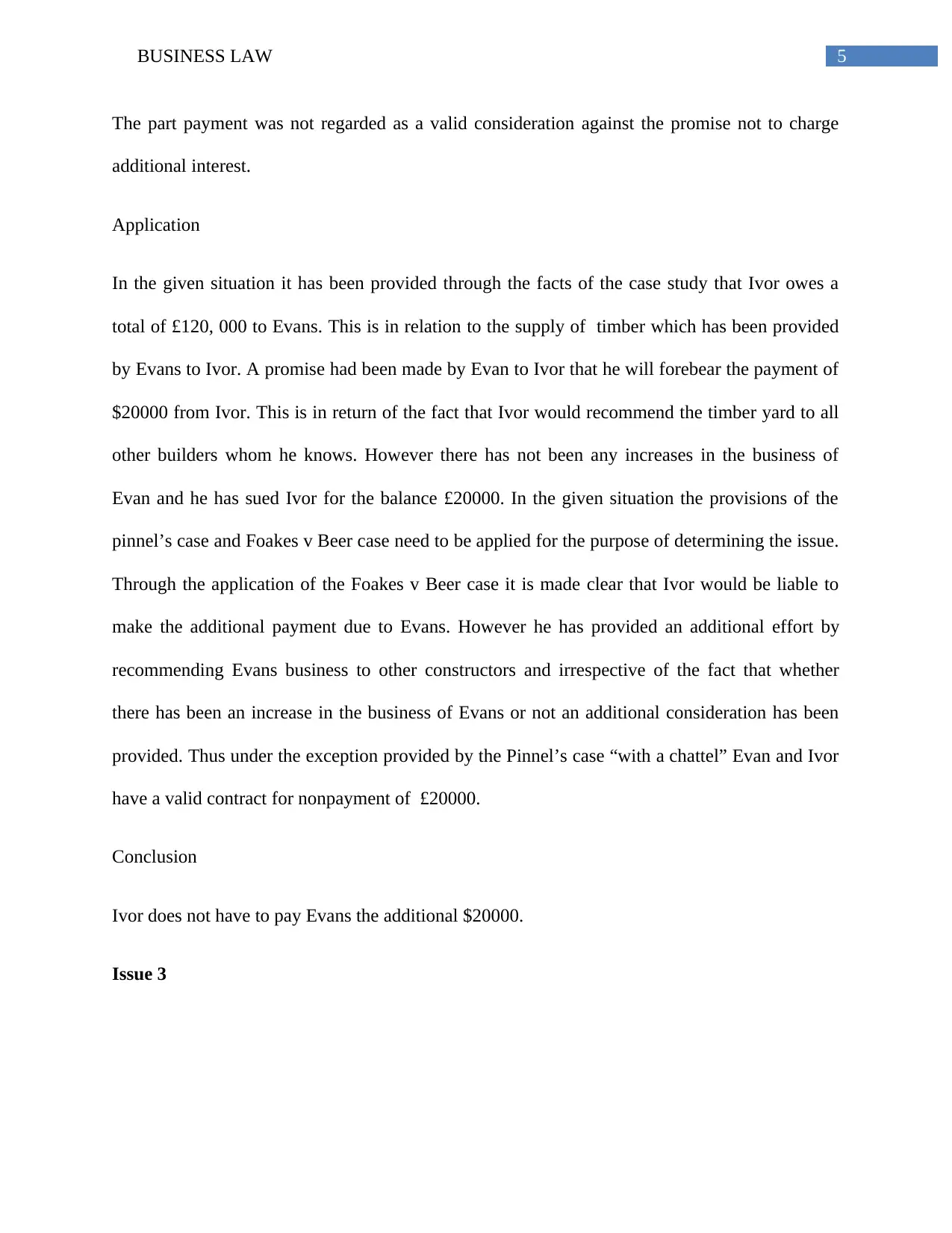
5BUSINESS LAW
The part payment was not regarded as a valid consideration against the promise not to charge
additional interest.
Application
In the given situation it has been provided through the facts of the case study that Ivor owes a
total of £120, 000 to Evans. This is in relation to the supply of timber which has been provided
by Evans to Ivor. A promise had been made by Evan to Ivor that he will forebear the payment of
$20000 from Ivor. This is in return of the fact that Ivor would recommend the timber yard to all
other builders whom he knows. However there has not been any increases in the business of
Evan and he has sued Ivor for the balance £20000. In the given situation the provisions of the
pinnel’s case and Foakes v Beer case need to be applied for the purpose of determining the issue.
Through the application of the Foakes v Beer case it is made clear that Ivor would be liable to
make the additional payment due to Evans. However he has provided an additional effort by
recommending Evans business to other constructors and irrespective of the fact that whether
there has been an increase in the business of Evans or not an additional consideration has been
provided. Thus under the exception provided by the Pinnel’s case “with a chattel” Evan and Ivor
have a valid contract for nonpayment of £20000.
Conclusion
Ivor does not have to pay Evans the additional $20000.
Issue 3
The part payment was not regarded as a valid consideration against the promise not to charge
additional interest.
Application
In the given situation it has been provided through the facts of the case study that Ivor owes a
total of £120, 000 to Evans. This is in relation to the supply of timber which has been provided
by Evans to Ivor. A promise had been made by Evan to Ivor that he will forebear the payment of
$20000 from Ivor. This is in return of the fact that Ivor would recommend the timber yard to all
other builders whom he knows. However there has not been any increases in the business of
Evan and he has sued Ivor for the balance £20000. In the given situation the provisions of the
pinnel’s case and Foakes v Beer case need to be applied for the purpose of determining the issue.
Through the application of the Foakes v Beer case it is made clear that Ivor would be liable to
make the additional payment due to Evans. However he has provided an additional effort by
recommending Evans business to other constructors and irrespective of the fact that whether
there has been an increase in the business of Evans or not an additional consideration has been
provided. Thus under the exception provided by the Pinnel’s case “with a chattel” Evan and Ivor
have a valid contract for nonpayment of £20000.
Conclusion
Ivor does not have to pay Evans the additional $20000.
Issue 3
⊘ This is a preview!⊘
Do you want full access?
Subscribe today to unlock all pages.

Trusted by 1+ million students worldwide
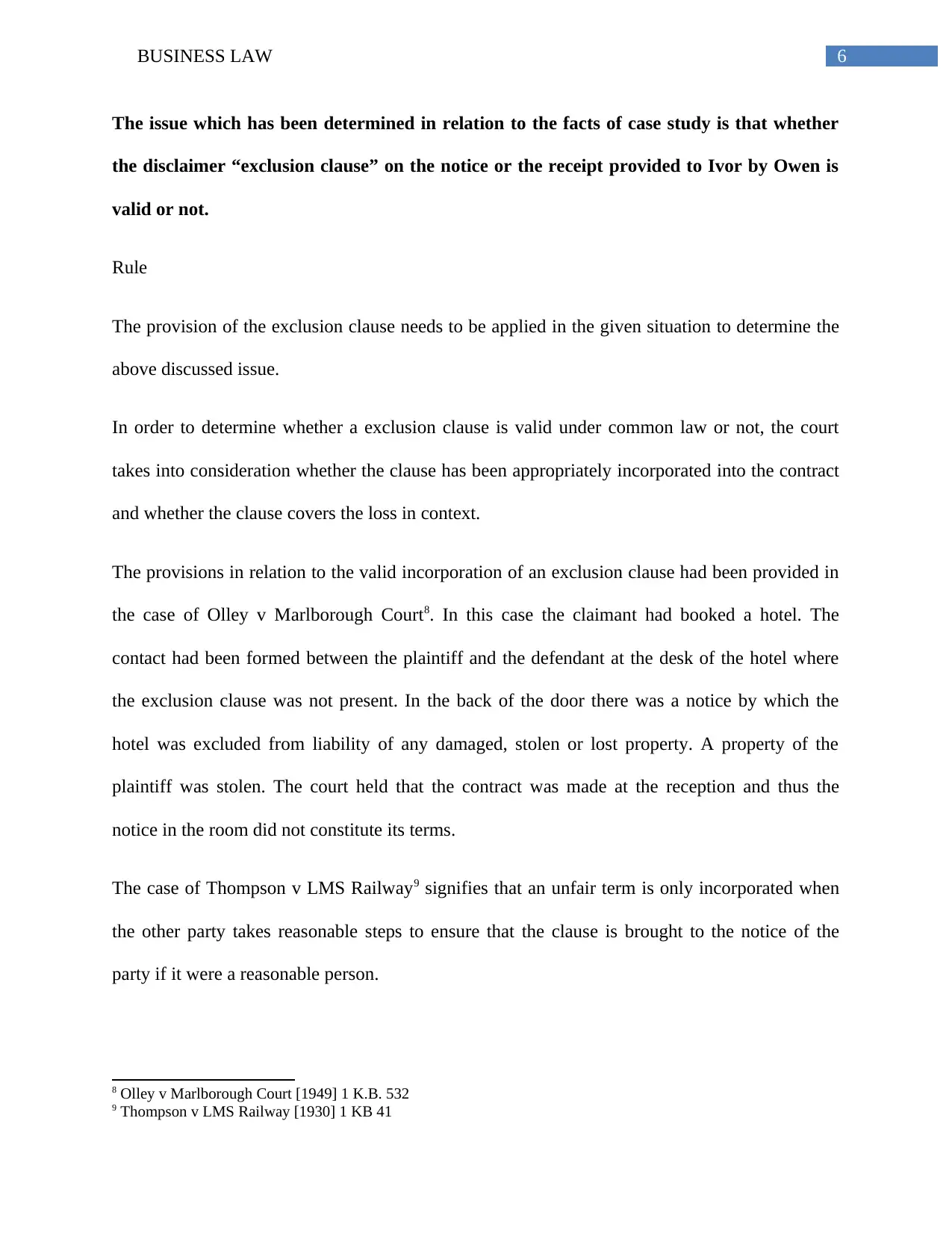
6BUSINESS LAW
The issue which has been determined in relation to the facts of case study is that whether
the disclaimer “exclusion clause” on the notice or the receipt provided to Ivor by Owen is
valid or not.
Rule
The provision of the exclusion clause needs to be applied in the given situation to determine the
above discussed issue.
In order to determine whether a exclusion clause is valid under common law or not, the court
takes into consideration whether the clause has been appropriately incorporated into the contract
and whether the clause covers the loss in context.
The provisions in relation to the valid incorporation of an exclusion clause had been provided in
the case of Olley v Marlborough Court8. In this case the claimant had booked a hotel. The
contact had been formed between the plaintiff and the defendant at the desk of the hotel where
the exclusion clause was not present. In the back of the door there was a notice by which the
hotel was excluded from liability of any damaged, stolen or lost property. A property of the
plaintiff was stolen. The court held that the contract was made at the reception and thus the
notice in the room did not constitute its terms.
The case of Thompson v LMS Railway9 signifies that an unfair term is only incorporated when
the other party takes reasonable steps to ensure that the clause is brought to the notice of the
party if it were a reasonable person.
8 Olley v Marlborough Court [1949] 1 K.B. 532
9 Thompson v LMS Railway [1930] 1 KB 41
The issue which has been determined in relation to the facts of case study is that whether
the disclaimer “exclusion clause” on the notice or the receipt provided to Ivor by Owen is
valid or not.
Rule
The provision of the exclusion clause needs to be applied in the given situation to determine the
above discussed issue.
In order to determine whether a exclusion clause is valid under common law or not, the court
takes into consideration whether the clause has been appropriately incorporated into the contract
and whether the clause covers the loss in context.
The provisions in relation to the valid incorporation of an exclusion clause had been provided in
the case of Olley v Marlborough Court8. In this case the claimant had booked a hotel. The
contact had been formed between the plaintiff and the defendant at the desk of the hotel where
the exclusion clause was not present. In the back of the door there was a notice by which the
hotel was excluded from liability of any damaged, stolen or lost property. A property of the
plaintiff was stolen. The court held that the contract was made at the reception and thus the
notice in the room did not constitute its terms.
The case of Thompson v LMS Railway9 signifies that an unfair term is only incorporated when
the other party takes reasonable steps to ensure that the clause is brought to the notice of the
party if it were a reasonable person.
8 Olley v Marlborough Court [1949] 1 K.B. 532
9 Thompson v LMS Railway [1930] 1 KB 41
Paraphrase This Document
Need a fresh take? Get an instant paraphrase of this document with our AI Paraphraser
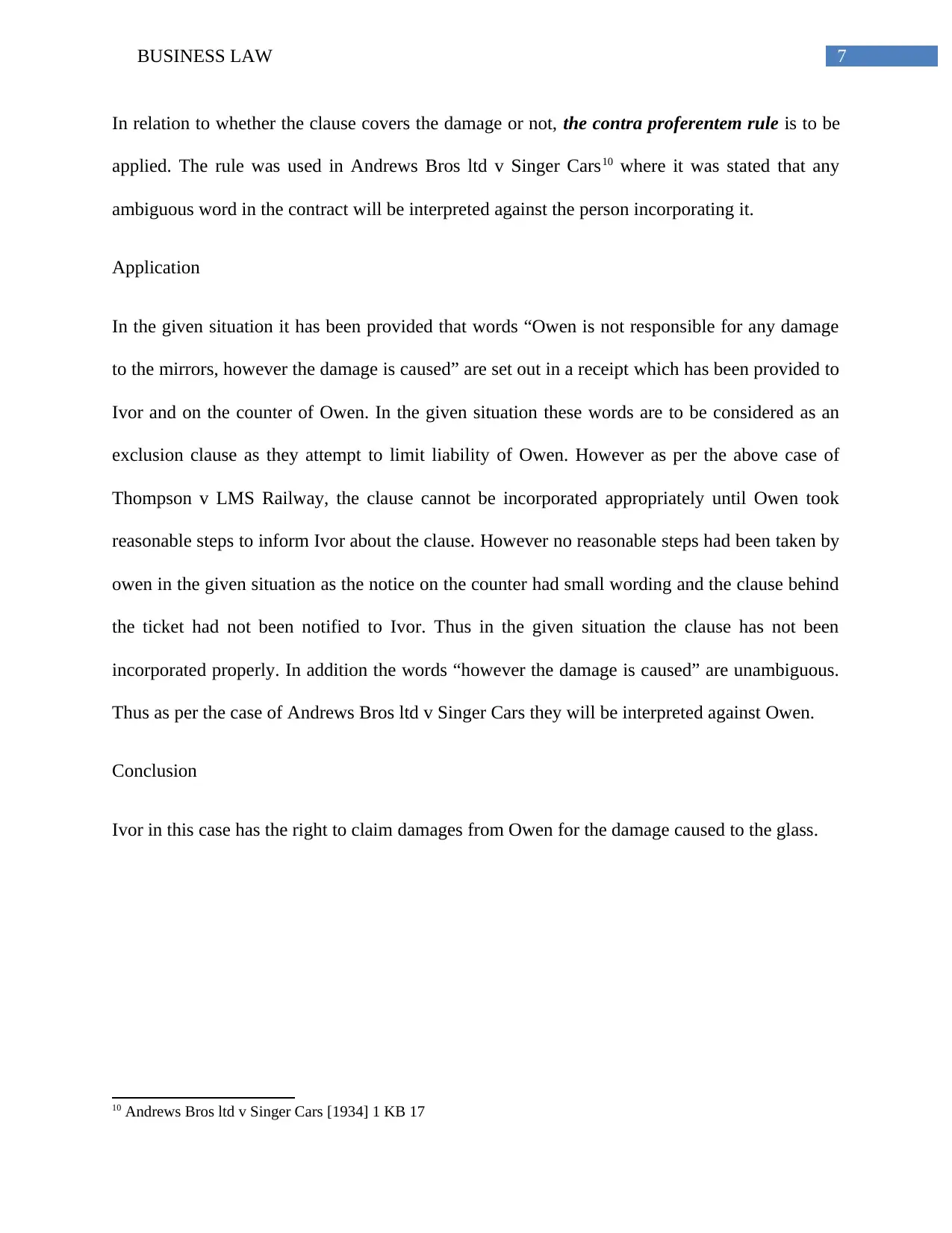
7BUSINESS LAW
In relation to whether the clause covers the damage or not, the contra proferentem rule is to be
applied. The rule was used in Andrews Bros ltd v Singer Cars10 where it was stated that any
ambiguous word in the contract will be interpreted against the person incorporating it.
Application
In the given situation it has been provided that words “Owen is not responsible for any damage
to the mirrors, however the damage is caused” are set out in a receipt which has been provided to
Ivor and on the counter of Owen. In the given situation these words are to be considered as an
exclusion clause as they attempt to limit liability of Owen. However as per the above case of
Thompson v LMS Railway, the clause cannot be incorporated appropriately until Owen took
reasonable steps to inform Ivor about the clause. However no reasonable steps had been taken by
owen in the given situation as the notice on the counter had small wording and the clause behind
the ticket had not been notified to Ivor. Thus in the given situation the clause has not been
incorporated properly. In addition the words “however the damage is caused” are unambiguous.
Thus as per the case of Andrews Bros ltd v Singer Cars they will be interpreted against Owen.
Conclusion
Ivor in this case has the right to claim damages from Owen for the damage caused to the glass.
10 Andrews Bros ltd v Singer Cars [1934] 1 KB 17
In relation to whether the clause covers the damage or not, the contra proferentem rule is to be
applied. The rule was used in Andrews Bros ltd v Singer Cars10 where it was stated that any
ambiguous word in the contract will be interpreted against the person incorporating it.
Application
In the given situation it has been provided that words “Owen is not responsible for any damage
to the mirrors, however the damage is caused” are set out in a receipt which has been provided to
Ivor and on the counter of Owen. In the given situation these words are to be considered as an
exclusion clause as they attempt to limit liability of Owen. However as per the above case of
Thompson v LMS Railway, the clause cannot be incorporated appropriately until Owen took
reasonable steps to inform Ivor about the clause. However no reasonable steps had been taken by
owen in the given situation as the notice on the counter had small wording and the clause behind
the ticket had not been notified to Ivor. Thus in the given situation the clause has not been
incorporated properly. In addition the words “however the damage is caused” are unambiguous.
Thus as per the case of Andrews Bros ltd v Singer Cars they will be interpreted against Owen.
Conclusion
Ivor in this case has the right to claim damages from Owen for the damage caused to the glass.
10 Andrews Bros ltd v Singer Cars [1934] 1 KB 17
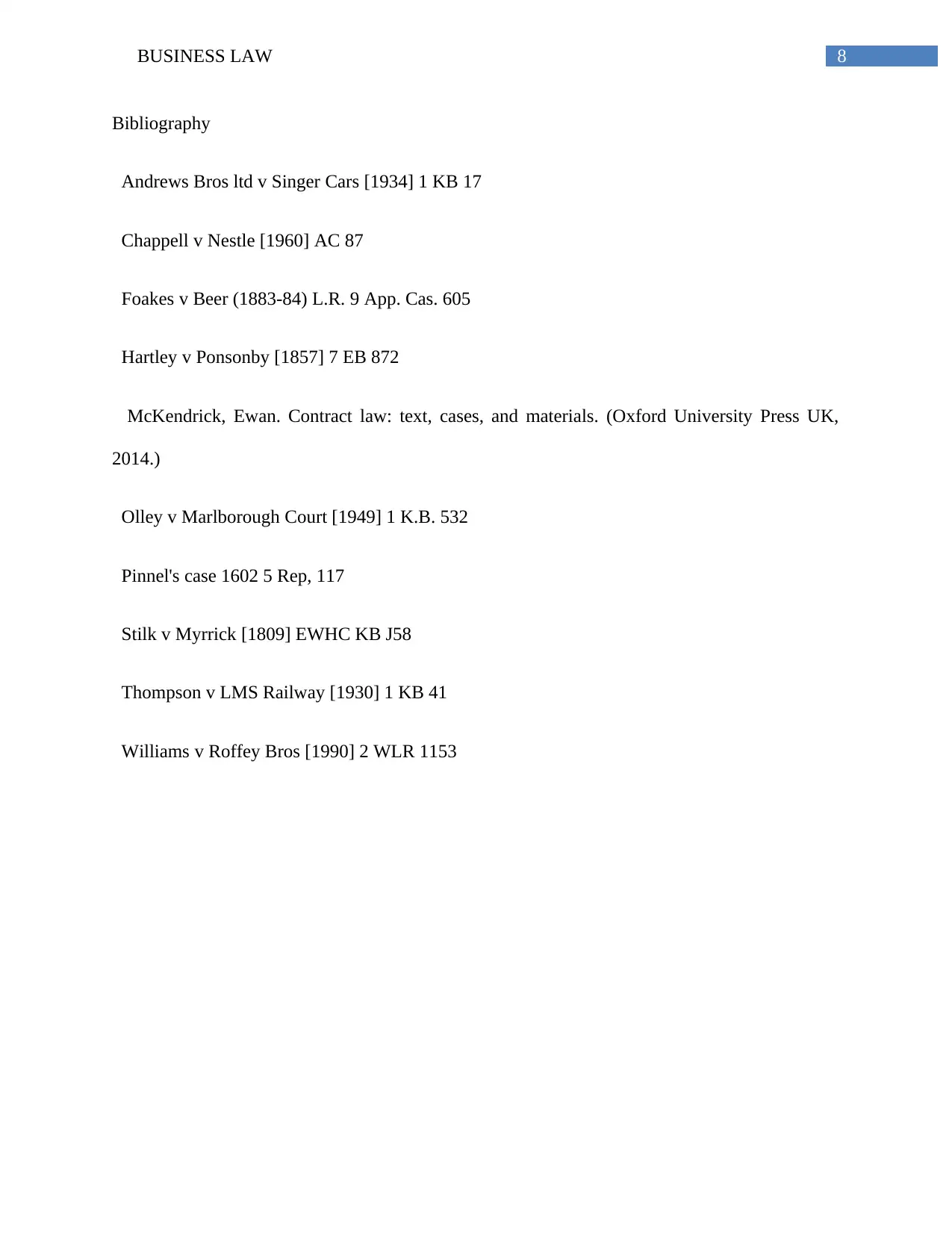
8BUSINESS LAW
Bibliography
Andrews Bros ltd v Singer Cars [1934] 1 KB 17
Chappell v Nestle [1960] AC 87
Foakes v Beer (1883-84) L.R. 9 App. Cas. 605
Hartley v Ponsonby [1857] 7 EB 872
McKendrick, Ewan. Contract law: text, cases, and materials. (Oxford University Press UK,
2014.)
Olley v Marlborough Court [1949] 1 K.B. 532
Pinnel's case 1602 5 Rep, 117
Stilk v Myrrick [1809] EWHC KB J58
Thompson v LMS Railway [1930] 1 KB 41
Williams v Roffey Bros [1990] 2 WLR 1153
Bibliography
Andrews Bros ltd v Singer Cars [1934] 1 KB 17
Chappell v Nestle [1960] AC 87
Foakes v Beer (1883-84) L.R. 9 App. Cas. 605
Hartley v Ponsonby [1857] 7 EB 872
McKendrick, Ewan. Contract law: text, cases, and materials. (Oxford University Press UK,
2014.)
Olley v Marlborough Court [1949] 1 K.B. 532
Pinnel's case 1602 5 Rep, 117
Stilk v Myrrick [1809] EWHC KB J58
Thompson v LMS Railway [1930] 1 KB 41
Williams v Roffey Bros [1990] 2 WLR 1153
⊘ This is a preview!⊘
Do you want full access?
Subscribe today to unlock all pages.

Trusted by 1+ million students worldwide
1 out of 9
Related Documents
Your All-in-One AI-Powered Toolkit for Academic Success.
+13062052269
info@desklib.com
Available 24*7 on WhatsApp / Email
![[object Object]](/_next/static/media/star-bottom.7253800d.svg)
Unlock your academic potential
Copyright © 2020–2025 A2Z Services. All Rights Reserved. Developed and managed by ZUCOL.





